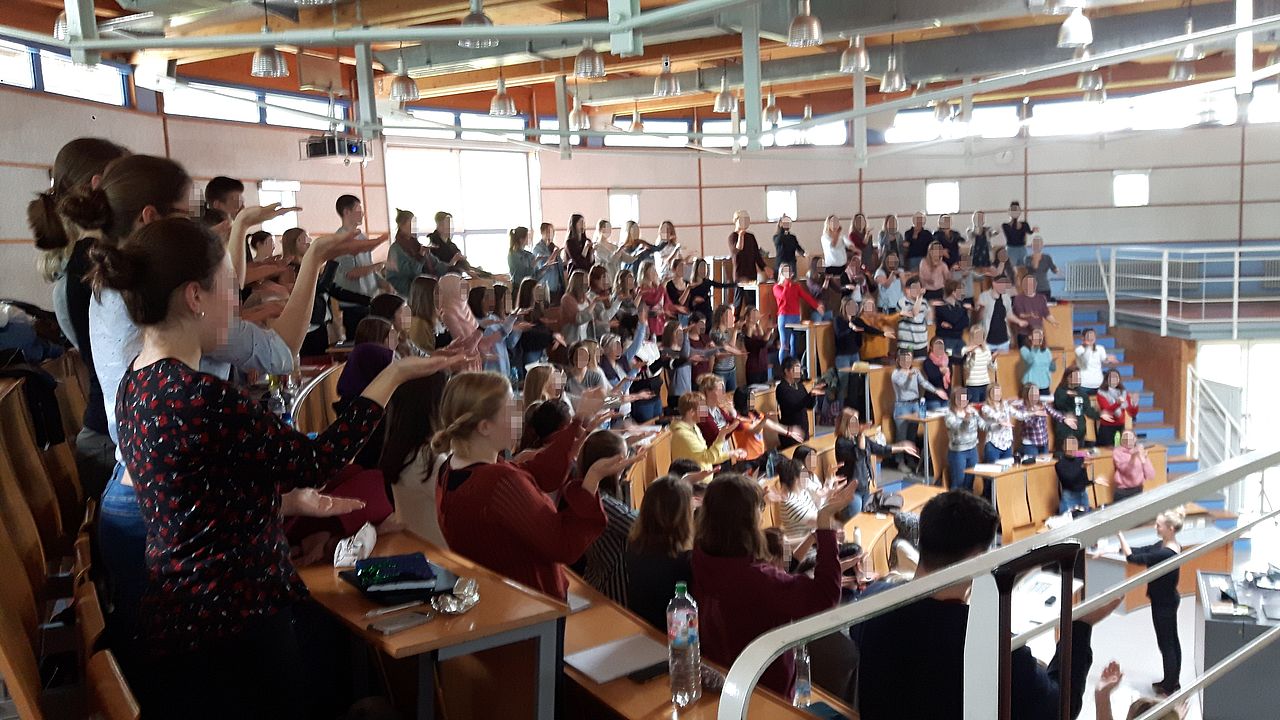Prof. Dr. Cornelia Herbert
Full Professor and Head of the Department of Applied Emotion and Motivation Psychology, Institute of Psychology and Education, Ulm University, Germany
Head of the Sports-Physio-Lab
Head of the Brain-Lab
Head of the Mobile-Lab
Current Academic Roles and Memberships
- Women’s Representative, Faculty of Engineering, Computer Science and Psychology, Ulm University, Germany
- Elected Member of the Medical Ethics Committee, Ulm University, Germany
- Elected Member of the Committee of Good Scientific Practice, Ulm University, Germany
- Member of the Center for Trauma Research, Ulm University, Germany
- Member of the Supervisory Board for Health Promotion in Students, Ulm University, Germany
- Member of the Supervisory Board for Education “Leitbild Lehre”, Ulm University, Germany
- Member of the Exercise is Medicine Group Ulm, Germany
Contact

Cornelia Herbert
Head of Dept. Applied Emotion and Motivation Psychology
✉ Cornelia Herbert
☎ +49-(0)731/50 32850
℻ +49-(0)731/50 31169
Π 47.1.243
Meeting hours
on appointment, please register via the Secretary’s office.
Research Interests
Affective Neurolinguistics; Language, Self, Emotion and Motivation; Physical Activity and Exercise; Mental Health and Well-Being; Cognitive Vulnerability, Depression, Schizophrenia, Body Image and Eating Disorders
Research Methods
Electroencephalography (EEG), Brain Imaging (FNIRS, FMRT), Psychophysiology (ECG, ICG, fEMG, Startle, taste), Mobile Assessment of Biosignals, Linguistic Analysis, Character Computing
Current Projects
- Processing preferences for self-related emotional words as markers of cognitive vulnerability and well-being – cerebral and behavioral correlates and mechanisms. Funded by the German Research Foundation, DFG.
- The bodily and linguistic self. Exploring the link between linguistic self-representations, the bodily self and the subjective experience of body ownership and agency. Funded by the German Research Foundation, DFG.
- “Sense and Feel”: Processing of bodily and affective information in children with major depression or anorexia nervosa and healthy adults with and without risk of depression. Clinical project (PI Herbert).
- Social Grammar. Funded by the NSC, National Science Center.
- Affective Judgements – Comparisons across Languages. Multicenter project (PI Herbert).
- Developing international collaborations for students in affective neurolinguistics. Funded by DAAD/PROMOS.
- Cross-Cultural, Multilingual and Psychologically-Driven Computational Approaches to Character Computing - Computer Science meets Psychology. Funded by the DAAD/BMBF.
- Brain in Motion: Neural markers of self-paced movements, motor-control and locomotion under single and dual-task conditions. Collaborative project (PI Herbert).
- Oral Health and Behavior Regulation. Multicenter project. Multicenter project (PI Herbert). Funded by bredent GmbH.
- Fit & Well: RCT-studies comparing the effects of different exercise interventions against the effects of non-exercise interventions vs. waiting list on experimental and self-report measures of mental health and well-being including mood, stress, emotion- and self-regulation, and quality of life.
- E-Move: Physical activity studies investigating personality, cognitive and affective profiles of physically active vs. sedentary people.
- Workshop for the Elderly (regular)
- Open-Lab-Days: Health and Fitness Check for Students (regular)
- Active Lectures for Students (regular)
Publications
Publications in Google Scholar.
Books, Book Chapters, Special Issues (last 5 years)
Herbert, C., Ethofer, T., Fallgatter, A. J., Walla, P., & Northoff, G. (2018). The janus face of language: Where are the emotions in words and where are the words in emotions?. Frontiers in Psychology, 9, 650. https://www.frontiersin.org/research-topics/2202/the-janus-face-of-language-where-are-the-emotions-in-words-and-the-words-in-emotions
Herbert, C., Ethofer, T., Fallgatter, A. J., Walla, P., & Northoff, G. (2018). The janus face of language: Where are the emotions in words and where are the words in emotions?. Frontiers in Psychology, 9, 650., www.frontiersin.org/articles/10.3389/fpsyg.2018.00650/full
Herbert, C. (2020). An Experimental-Psychological Approach for the Development of Character Computing. In Character Computing (pp. 17-38). Springer, Cham.
Herbert, C., El Bolock, A., & Abdennadher, S. (2020). A Psychologically Driven, User-Centered Approach to Character Modeling. In Character Computing (pp. 39-51). Springer, Cham.
El Bolock, A., Abdennadher, S., & Herbert, C. (2020). Applications of Character Computing From Psychology to Computer Science. In Character Computing (pp. 53-71). Springer, Cham.
Free Preview: www.springer.com/gp/book/9783030159535
Stefanova, E., Dubljević, O., Herbert, C., Fairfield, B., Schroeter, M. L., Stern, E. R., ... & Drach-Zahavy, A. (2020). Anticipatory feelings: neural correlates and linguistic markers. Neuroscience & Biobehavioral Reviews.
Herbert, C. (2019). Where are the emotions in written words and phrases? Commentary on Hinojosa, Moreno and Ferré: Affective neurolinguistics: towards a framework for reconciling language and emotion (2019). Language, Cognition and Neuroscience, 1-6.
Herbert, C. (2019). Zum Zusammenhang von Sprache, Emotion und Körperlichkeit aus Sicht von Psychologie und Neurowissenschaft. In Emotionen (pp. 272-281). JB Metzler, Stuttgart.
Herbert, C. (2015). Human emotion in the brain and the body: Why language matters: Comment on "The quartet theory of human emotions: An integrative and neurofunctional model" by S. Koelsch et al. Physics of Life Reviews, 13, 55.
Oral Presentations and Workshops (Public)
Exercise and Health
Herbert, C. (2020). Balance durch Bewegung. ARTISO und Stadt Blaustein.
[Link]
Herbert, C. (2019). Akute und langfristige Auswirkungen von Sport, körperlicher Aktivität und Bewegung auf Kognition, Emotion und das subjektive Wohlbefinden. Studium Generale, Ulm.
[Link]
Herbert, C. (2017). Sport und Persönlichkeit – sind Sportler wirklich anders? Sportmedizinisches Symposium Mercedes Cup 2017, Stuttgart.
[Link]
Herbert, C. (2016). Einstellungen zum Körper, Stress- und Emotionsregulation im Leistungssport. Sportmedizinisches Symposium Mercedes Cup 2016, Stuttgart.
[Programmheft]
Herbert, C. (2015). Emotions- und Gedächtnisforschung im Leistungssport. Sportmedizinisches Symposium Mercedes Cup 2015, Stuttgart.
[Flyer]
Herbert, C. (2013). Depression, Angst und Burnout im Leistungssport: Eine Herausforderung für die Praxis. 9. Jahreskongress Psychotherapie, Hochschulverband Psychotherapie NRW, Oktober 2013, Bochum.
Herbert, C. (2014). Emotionswahrnehmung, Körperschema und Essstörung bei Athleten als Hochrisikogruppe: Experimentelle Studien und Intervention, Sommerakademie der Studienstiftung, August 2014, Creglingen.
Workshops – Sports and Exercise
Open Lab Day
[Programmheft]
Check your Health (day 1)
Professional gait analysis (day 2)
Physical Activity for the Elderly
[Programmheft]
Active Break for University Students

Emotions, Self and Language
Herbert, C. (2019). „Gefühle vermessen? Objektivität in der Psychologie“. Studium Generale, Ulm.
[Link]
Herbert, C. (2017). „Mein Ich und die anderen: Wie unser Gehirn 'selbst' von 'fremd' unterscheidet und wir trotzdem mit anderen mitfühlen können“. Studium Generale, Ulm.
[Link]
Behavior Computing / Character Computing
Herbert, C. (2019). Analyzing Humans. Crossing Borders. Psychology Meets Computer Science. Dec. 2019, Ulm University.
[Link]
ElBolock, A., Abdennadher, S., Herbert, C. (2020) PAAMS 20 Workshop on Character Computing (C2).
[Link]
Abdennadher, S., Herbert, C. ElBolock, A., et al.(2019). 17th International Conference on Mobile and Ubiquitous Multimedia. C2: 2nd Workshop on Character Computing - Computer Science meets Psychology.
[Link]
Interviews (TV, Newspapers, Blogs)
Südwestpresse, März 2020: Interview zum Corona: Wir brauchen Verhaltensregeln, die Angst nehmen. Das Coronavirus verändert Umgangsformen und Gewohnheiten. Ein Gespräch mit Professor Cornelia Herbert, Psychologin an der Uni Ulm. [Link]
ARTE-ARD-XENIUS- Gute Gefühle: Emotionen sind zentrale Bausteine der menschlichen Existenz. Freude, Traurigkeit, Angst, Überraschung - die Palette der menschlichen Gefühle ist breit. Dabei streben wir vor allem nach den guten, angenehmen Gefühlen. Wie die ausgelöst werden und was dabei im Körper geschieht, erforschen Emotionspsychologen an der Universität Ulm. [Link]
Fasten ist mehr als Verzicht. [Link]
Die Psychologie der Motivation: Tipps: So rafft man sich auf. [Link]
Mit der Kauf-Nix-Liste gegen den Shoppingwahn. [Link]
Emotion und Sprache, Sport und Gesundheit: Angewandte Emotions- und Motivationspsychologie an der Uni Ulm. [Link]
StudiSpazz, Heft 24-18, Know Your PROF! Autorin Nicole Kirsten trifft eine(n) Professor(in) zum Gespräch: Heute: Prof. Dr. Cornelia Herbert [Link]
